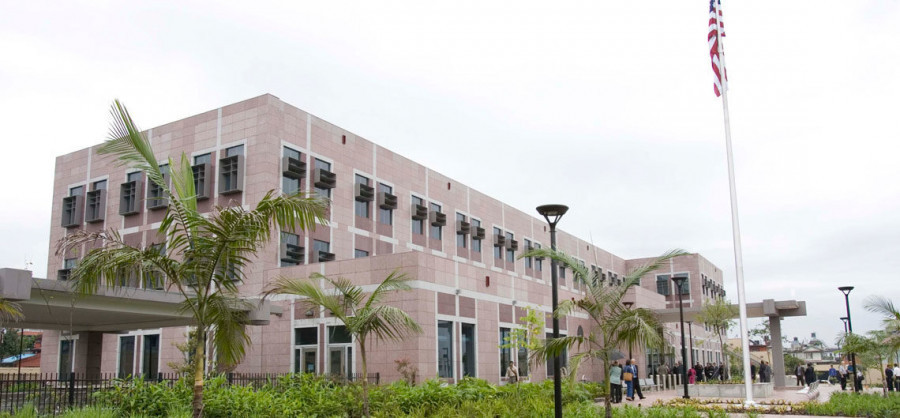National
US Embassy takes to social media to dispel MCC rumours
There have been a number of videos on YouTube awash with disinformation on the MCC compact, calling it an American ploy to ‘trap’ Nepal.
Shuvam Dhungana
After at least two interviews by American officials to the Post and separate calls to top leaders of Nepal by a US assistant secretary from the Department of State, the debate over the Millennium Challenge Corporation-Nepal Compact has heated up in Nepal.
As the government prepared to table the $500 million US grant in Parliament, protests erupted with police resorting to using tear gas and water cannons to disperse the crowds.
There have been a number of videos on YouTube awash with disinformation on the MCC compact, calling it an American ploy to “trap” Nepal.
The United States has time and again tried to clarify that the MCC compact is purely a grant assistance that it is extending to Nepal in honour of its long-standing relations with the only objective of helping plug the gap in electricity supply, and improving roads.
The US has also for long raised its concerns about the spread of disinformation in Nepal on various platforms like social media and YouTube channels about the MCC compact.
After the phone conversations by Donald Lu, US assistant secretary, to Prime Minister Sher Bahadur Deuba, Maoist chair Pushpa Kamal Dahal and UML chair KP Sharma Oli, reports suggested he also warned of some external hands, including China, in the attempts to block the compact in Nepal.
Lately, the US embassy in Nepal has activated its social media team and put out a series of tweets and Facebook posts on disinformation and propaganda, stopping short of mentioning the MCC compact.
The context is obvious.
“Disinformation and propaganda have had serious consequences throughout history. State-led disinformation and propaganda have threatened democracies, inflamed wars, and provoked violence,” the US embassy Nepal wrote on Facebook on February 13. “It has fomented distrust of facts, science, and credible journalism.”
Only recently, the US embassy even organised an interaction on disinformation with Nepali media experts.
“For the next few weeks, we will discuss disinformation and how we all can be fooled by it,” the embassy wrote.
Washington has set a February 28 deadline for the Nepali leadership to ratify the compact from Parliament, as demanded by Prime Minister Deuba and Maoist chair Dahal. Lu during his conversations also said that failure to do so could force the US to review its ties with Nepal.
Amid the raging debate over the MCC compact, geopolitical factors too have come strongly into play.
US officials have communicated on multiple occasions that they are seriously concerned about disinformation in Nepal about the MCC compact.
Last month, in an interview with the Post, Mahmoud Bah, acting CEO of MCC, said that MCC has been the target of “a sophisticated and malicious misinformation and disinformation campaign to discredit our agency and the Government of Nepal in order to prevent the MCC-Nepal Compact from progressing.”
“You will notice that each time the government of Nepal seems poised to move forward towards ratifying the MCC compact, there is a sudden increase in false and misleading statements about MCC, especially on social media and YouTube,” Bah said. “It is even more disheartening when some of Nepal’s political leaders have perpetuated these misleading statements, which only hurts the people of Nepal.”
Earlier this week, a US State Department spokesperson expressed the US concerns about disinformation campaigns in Nepal.
“Yes. We have been concerned about disinformation campaigns surrounding the MCC Compact, as we are concerned with disinformation everywhere,” the spokesperson told the Hindustan Times. “Should outside influence or corruption have influenced parliamentarians’ actions to vote against this electricity-transmission project, it would be deeply disappointing and a loss for the people of Nepal.”
Nepal in September last year had even written to MCC seeking clarifications on some of the points, including whether the compact is above Nepal’s constitution and whether it has any security component attached to it. MCC in its point-wise response had said the compact is not above Nepal’s constitution and that it does not have any security components.
Those opposing the compact, including some Nepali politicians, however, have refused to accept the US assertion.
Nepal’s ruling alliance has been in a bid to find consensus on the compact ratification as the deadline nears. A meeting of the five parties on Friday, the second in a row, failed to reach any consensus. They have decided to sit again on Sunday.
Prime Minister Dueba, however, appears firm on tabling the MCC compact. He reached out to UML chair Oli on Thursday evening after the five-party alliance’s meeting ended inconclusively.
US Ambassador Randy Berry lately has held talks with both Deuba and Oli, according to leaders from their orbits.
On Friday, demonstrators gathered in New Baneshwar in front of the Parliament building and resorted to burning tyres to protest against MCC.
Berry took to Twitter to assert that America believes in free speech.
“We are a strong supporter of free speech & public discourse based on fact, including on MCC. The right to express one’s views is intrinsic to democracy, and people must be allowed to peacefully share their views,” Berry tweeted. “Violence & incitement to violence are never acceptable.”



 8.22°C Kathmandu
8.22°C Kathmandu














